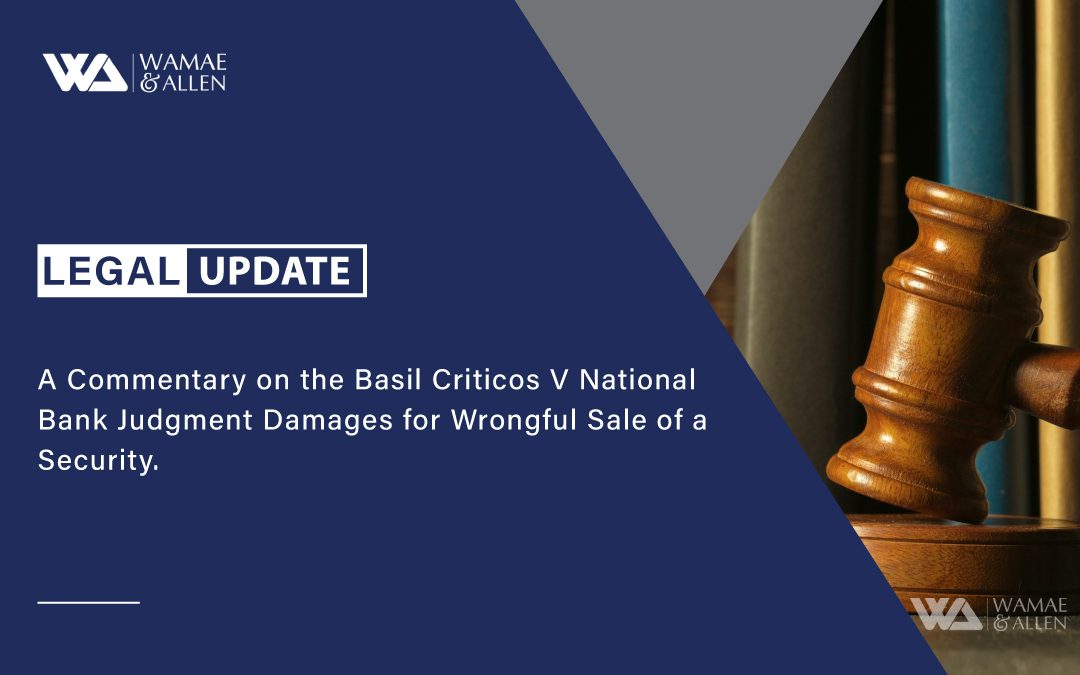“He may not have been a model guarantor but, like Shakespeare’s King Lear, he definitely was a man more sinned against than sinning. And he was entitled to the aid of the law.” – Extract from judgment in Nairobi Civil Appeal No. 80 of 2017 Basil Criticos vs. National Bank of Kenya Ltd & Another delivered on 28th April 2022.
INTRODUCTION
The appeal was about a bank that trampled on the rights of a guarantor whose land was sold at a gross undervalue in contempt of injunctive orders that were in place. The bank acted in bad faith and refused to accept the Appellant’s offer of Kshs. 63 million to redeem the charged property and instead sold the land for Kshs. 55 million. Strangely, it later sued the Appellant under his guarantee for Kshs. 20 million without refunding the surplus of Kshs. 35 million which was an express admission that his liability was limited to Kshs. 20 million.
The Appellant’s land had 7,000 acres of sisal, buildings and various crops on 15,994.5 acres and was sold for a paltry Kshs. 3,439 per acre.
FACTS OF CLAIM
It is not in dispute that Basil Criticos was a guarantor for the sum of Kshs. 20 million. When the borrower defaulted, the bank called up the guarantee and imposed interest that was compounded at 35% per month which amounted to 420% per annum. At one time the bank had in 2006 found a purchaser for 300 acres of the charged property offering Kshs. 28,500,000.
In an unfortunate twist of events, the bank reneged on an earlier agreement to subdivide part of the land to settle the debt and instead ignored injunctive orders obtained by some of the purchasers, who with the consent of the bank purchased various plots and paid deposits to the bank, sold the entire land (inclusive of the sub-divisions) for Kshs. 55 million.
In one of the fastest conveyancing transactions in history, the sale agreement between the bank and the purchaser was executed in the morning and the property transferred to the purchaser in the afternoon without payment of a single cent. The full purchase price was paid six months later in defiance of injunctive orders that barred the bank from accepting the purchase price.
The case was party heard by three different judges in the high court. After two judges were transferred, the last judge who came at the tail end of the trial dismissed the suit and failed to justly determine the real issues in controversy and ignored the evidence and the law on the liability of a guarantor and the right to redeem charged property.
One important factor is that the bank never produced any counter valuation report to rebut the concise valuation report submitted by the guarantor’s expert valuer and instead relied on a biased valuation report by a government valuer which was relied upon at the time of the unlawful sale. It is also important to point out that the bank’s own valuation reports done years before the sale gave a much higher value for the property.
COURT OF APPEAL JUDGMENT
On appeal, the Court of Appeal set aside the judgment and ordered a refund of the surplus of Kshs. 35 million and damages of Kshs. 2,284,101,000.
The summary of the Court of Appeal judgment is as follows:
- Where a guarantee limits the guarantor’s liability to a fixed sum, the guarantor will be liable to the extent of the guarantee only and not to the entire debt of the principal debtor.
- It was unconscionable for the bank to demand the impossibly high rate of 35% per month amounting to 420% per annum which was grossly unfair and oppressive as no court would lend support to such onerous, unconscionable and plainly usurious conduct by lenders.
- The sale of the charged property was in violation of valid injunctive orders in place. The high court erred in failing to take cognizance of the fact that the various injunction orders had been issued in the presence of the bank’s advocates and personal service on the bank was not required.
- The Court of Appeal agreed with the decision by the Supreme Court in Attorney General v Zinj Limited [2021] eKLR where the Supreme Court held that a trial court in assessing compensatory damages for wrongful sale of land must be guided by a valuation report which can only be countered by another valuation report. In the absence of a counter valuation report that would perhaps have shown breach of fundamental principles of valuation, there was no basis for a court to interfere with the award on assessment of damages.
- The bank was liable under Section 99(4) of the Land Act that reads “A person prejudiced by an unauthorized, improper or irregular exercise of the power of sale shall have a remedy in damages against the person exercising that power.”
In conclusion, the Court found that the bank had treated Basil Criticos in a shabby and wholly unacceptable if not tyrannous manner in the entire transaction when it charged manifestly excessive interest rates, declined his offers to redeem the debt, proceeded to sell the property at less than the amount offered and at a gross under sale in plain breach of the bank’s duty to act with care and in good faith.
COMMENTS
This decision is a reminder that:
-
- The equity of redemption and the limitation of liability under a guarantee are vital factors to be considered by a chargee when exercising its statutory power of sale. The Constitution had by virtue of article 10(2) (b) elevated equity as a principle of justice to a constitutional principle and required the Courts in exercising judicial authority to protect and promote that principle, amongst others- per the Court of Appeal judgment in Willy Kimutai Kitilit v Michael Kibet [2018] eKLR.
- A chargee relying on a defective and flawed valuation report will invite the rebuttal presumption that it has breached the statutory duty imposed by Section 97(1) of the Land Act which imposed a mandatory duty to obtain the best price reasonably obtainable at the time of sale failing which damages will be awarded if the sale was unauthorized, improper or irregular under Section 99(4) of the Land Act.
- Failure to produce an alternative valuation report in rebuttal is fatal to a chargee’s defence when faced with a claim for damages.
- Courts must be vigilant to ensure that justice is done and not simply dismiss a case after trial without giving due consideration to the legal issues.
This article is provided free of charge for information purposes only; it does not constitute legal advice and should be relied on as such. No responsibility for the accuracy and/or correctness of the information and commentary as set in the article should be held without seeking specific legal advice on the subject matter. If you have any query regarding the same, please do not hesitate to contact Litigation vide litigation@wamaeallen.com
See also the article: In duplum law must be expanded to cover all borrowers
